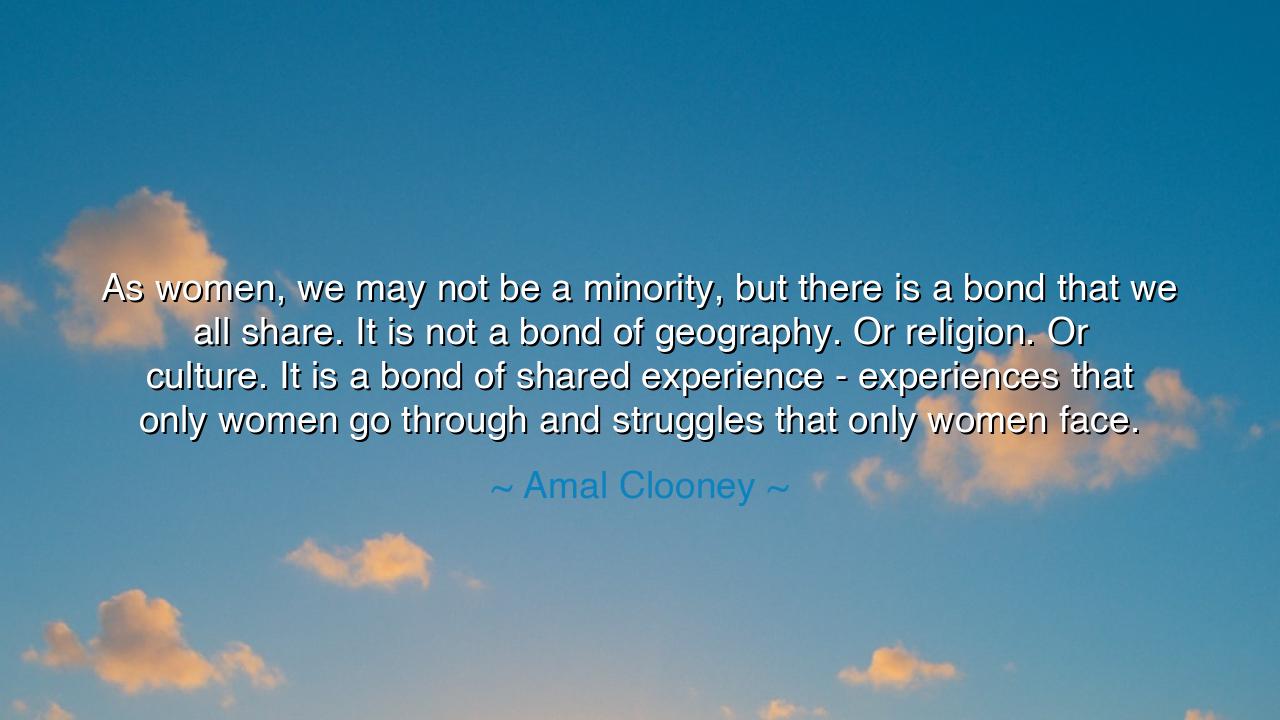
As women, we may not be a minority, but there is a bond that we
As women, we may not be a minority, but there is a bond that we all share. It is not a bond of geography. Or religion. Or culture. It is a bond of shared experience - experiences that only women go through and struggles that only women face.






"As women, we may not be a minority, but there is a bond that we all share. It is not a bond of geography. Or religion. Or culture. It is a bond of shared experience - experiences that only women go through and struggles that only women face." These powerful words from Amal Clooney highlight the unique and universal connection that exists among women across the world. While geography, religion, and culture may differ, womanhood binds women together in a way that transcends all differences. It is a bond rooted not in shared beliefs or origins but in the shared experiences and struggles that shape women’s lives. Clooney emphasizes that the experiences of discrimination, oppression, and resilience that women endure form a collective bond that speaks to the core of what it means to be a woman.
The origin of this truth can be found in ancient traditions that recognized the power of shared experience in shaping the human condition. Aristotle spoke of humans as social creatures, beings whose identities were formed not in isolation but through their connections with others. However, he also acknowledged that individuals were shaped by the circumstances of their lives, including the specific roles they played within society. In the case of women, the bond of shared experience has historically been shaped by the roles that society has forced women to occupy — roles of subjugation, expectation, and often silence. Yet, within this shared experience, there also lies a strength that has allowed women to resist and transform the very systems that sought to suppress them.
Consider the ancient story of Antigone, the tragic heroine of Sophocles' play, who defied the laws of her uncle, King Creon, to bury her brother according to her familial and spiritual duty. Her actions were not just those of an individual but those of a woman standing up against a patriarchal system that dictated her place in the world. Antigone’s struggle is emblematic of the shared experience of women throughout history — the struggle for autonomy, for justice, and for voice in a world that often silences them. Her courage to act on her moral beliefs, despite knowing the personal cost, reflects the resilience that binds women together in their pursuit of justice and self-determination.
In more recent history, Malala Yousafzai offers a contemporary example of the same unbreakable bond that Clooney speaks of. Malala, a young girl from Pakistan, defied the oppressive forces of the Taliban, who sought to deny girls education. She was shot for speaking out, but she survived and continues to fight for the rights of women and girls around the world. Her courage and the worldwide support she garnered speak to the universal struggle that women face in fighting for education, equality, and freedom. Malala’s story is the modern echo of the ancient struggle, illustrating how the bond Clooney speaks of continues to inspire solidarity and action among women globally.
The lesson that Clooney imparts is one of unity and solidarity. While women come from different walks of life, backgrounds, and faiths, they share a bond that cannot be easily broken. It is a bond formed through the struggles they face as women — struggles that arise not simply because of their gender, but because of the roles that society has imposed on them. Clooney’s words remind us that empowerment and change begin when women recognize that their individual struggles are part of a larger global narrative. By uniting around the shared experience of womanhood, women can break the chains of oppression and build a world that values their voices, their contributions, and their rights.
In practical terms, the message from Clooney’s statement calls women to support one another, to stand together against the forces that seek to divide them. Solidarity is a powerful tool in combating the systemic inequalities and violence that affect women globally. Whether through activism, education, or personal connections, women must recognize that their fight for equality and respect is not one they fight alone. Just as Antigone and Malala found strength in their actions, women today can find strength in the unity of their shared experiences. By sharing their stories, supporting one another, and demanding change, they can transform not only their individual lives but also the lives of generations to come.
To apply this wisdom in our own lives, we must create spaces of support and empowerment for women everywhere. Whether in our communities, in the workplace, or in global platforms, we must lift each other up, recognizing the common struggles that unite us all. It is not enough to simply acknowledge the pain of women’s experiences; we must actively work to change the systems that perpetuate inequality and create environments that honor and celebrate the strength of women. By doing so, we continue the work of women who have come before us and ensure that the bond Clooney speaks of is one that remains unbroken, unshaken, and full of promise for the future.






AAdministratorAdministrator
Welcome, honored guests. Please leave a comment, we will respond soon